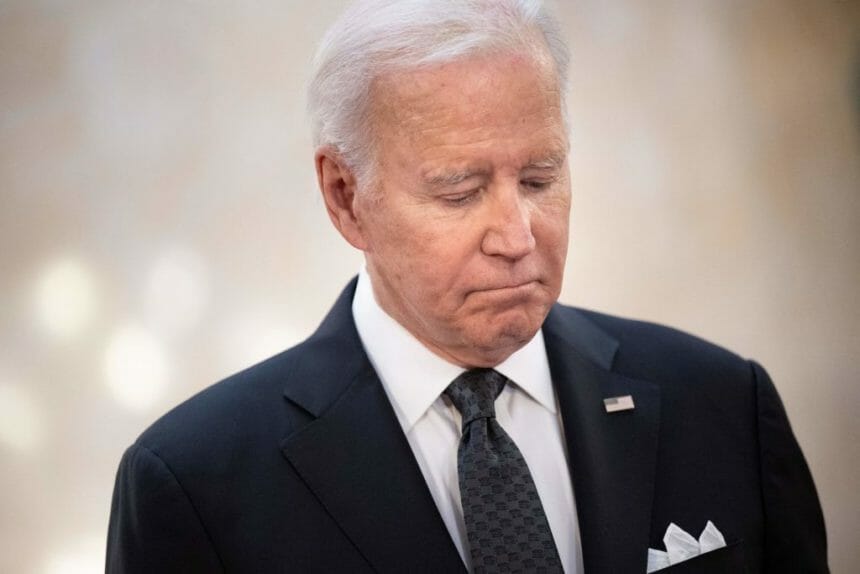After the tumult of the COVID-19 rollercoaster over the last several years, President Biden made the most definitive comments about the end of the pandemic to date.
“The pandemic is over,” Biden said during a 60 Minutes interview Sunday. “We still have a problem with COVID. We’re still doing a lot of work on it. But the pandemic is over. If you notice, no one’s wearing masks. Everybody seems to be in pretty good shape, and so I think it’s changing.”
The U.S. has been through the wringer with the pandemic: from lockdowns to flip-flopping over mask mandates to an unexpected Omicron surge. COVID has already claimed the lives of more than 1 million Americans, according to the Centers for Disease Control and Prevention. In the minds of many, there is a desire to put this chapter of history in the rearview mirror.
Indeed, mask mandates and restrictions around in-person gatherings have loosened significantly in the last year. On a day-to-day basis, most people have returned to some semblance of normal – mostly thanks to robust vaccination efforts.
Worldwide, 67.9% of people have received at least one dose of a COVID-19 vaccine, though that’s generally much lower in low-income countries, according to Our World in Data. In the U.S., almost 68% of people have full vaccination while 79% have received at least one dose.
Still, a solid percentage of the American population hasn’t been vaccinated, and the virus hasn’t disappeared. According to the CDC, the U.S. is still facing an average of 60,831 new cases daily; as well as an average of 391 deaths daily.
Elyse Margolis, president of Real Chemistry, said that although the general public is looking for a decisive end to the pandemic, such a declaration runs the risk of lulling people into “a dangerous sense of complacency.”
“With millions of Americans living with underlying health conditions that still put them at risk for hospitalization with a positive COVID infection, it is critical that we stay several steps ahead from a messaging standpoint and continue to educate the public about the continued importance of protection through vaccination and the goals and appropriate candidates for treatment, should they test positive for COVID-19,” Margolis said. “Although our darkest days of the pandemic are behind us, we must continue to follow the science and ensure we’re continuing to translate the science into information and action the public can use.”
Similarly, Jon Bigelow, executive director at the Coalition for Healthcare Communication, noted the president’s comments may have come a bit too soon and could ultimately be unhelpful in the long run particularly when it comes to communicating to the public about vaccination.
“New waves of COVID-19 are still quite possible, especially as we head into the winter,” Bigelow said. “Millions of Americans still have not been vaccinated; many who have been, have not bothered to get boosters and say they will not get the newer, Omicron-specific vaccine. Underlying all of this is that public health officials—and all of us involved in health communication–continue to have a communications problem in persuading citizens that the science clearly supports widespread immunization.”
There is also speculation about how President Biden’s declaration may also prompt those in the Senate who have opposed additional funding for COVID-19 tests, vaccines, therapies and programs to continue declining to approve new funds.
Earlier this year, Congress dropped a proposed $15.6 billion COVID-19 funding package from the spending bill, ultimately not replenishing funds that would go towards testing, treatments, vaccines and other COVID-related infrastructure.
Dr. Leana Wen, a public health professor at George Washington University and former Baltimore health commissioner, agreed that Biden’s stance could jeopardize funding in Congress, which has already been faltering.
“For most Americans, the pandemic is over in that they have resumed most if not all aspects of pre-pandemic normal,” Wen said. “But just because COVID-19 is no longer an emergency, it doesn’t mean funding should stop. There is still a crucial imperative to fund testing, treatments and vaccines, and to bolster our public health infrastructure to prepare for the next pandemic.”
For others in the medical community, Biden’s step toward leaving the pandemic as an emergency behind is an inevitable one. Dr. Amesh Adalja, a senior scholar at Johns Hopkins Center for Health Security, shares the president’s sentiment — which was also recently echoed by the World Health Organization director-general.
“[COVID-19 in the U.S.] has clearly been shifted to an outpatient illness,” Adalja said. “It no longer has the ability to threaten hospital capacity. The tools we have for this respiratory virus are greater than for any other respiratory virus: vaccines that are highly effective at preventing severe disease, antivirals, home tests, monoclonal antibodies and wastewater surveillance. While we’ll always have a baseline level of COVID-19 cases, hospitalizations and deaths — the post-pandemic world is not the world of 2019.”







